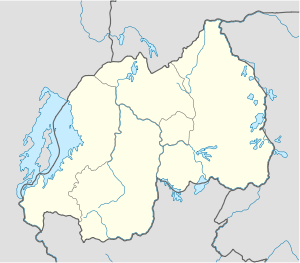Ndora
| Ndora | |
|---|---|
| Village | |
 Ndora Location in Rwanda | |
| Coordinates: 2°36′12″S 29°50′1″E / 2.60333°S 29.83361°ECoordinates: 2°36′12″S 29°50′1″E / 2.60333°S 29.83361°E | |
| Country |
|
| Province | Butare Province |
| District | Gisagara District |
| Area | |
| • Total | 61 km2 (24 sq mi) |
| Elevation | 1,684 m (5,525 ft) |
| Population (2012 census) | |
| • Total | 23,813 |
| • Density | 390/km2 (1,000/sq mi) |
| Time zone | CAT (UTC+2) |
Ndora is a village and commune/sector[1][2] in Butare Province, southwestern Rwanda, located roughly 10 kilometres east of the city of Butare. It is a farming community inhabited mainly by Hutu people.[2] Pauline Nyiramasuhuko was born in Ndora in 1946.[3] Callixte Kalimanzira, head of the Ministry of Interior and Communal Development, met in Ndora on June 7, 1994 and warned the people that the Rwandan Patriotic Front ([RPF) were using small children who should also become targets.[4]There is said to be an iron-smelting furnace in Ndora.[5][6]A number of Hutu women in the village were widowed during the Rwandan Genocide.[2]
References
- ↑ African Rights (Organization) (2000). Witness to genocide. African Rights. Retrieved 27 June 2011.
- ↑ 2.0 2.1 2.2 African Rights (Organization) (1995). Rwanda, not so innocent: when women become killers. African Rights. p. 35. ISBN 978-1-899477-05-0. Retrieved 27 June 2011.
- ↑ Sjoberg, Laura; Gentry, Caron E. (2007). Mothers, monsters, whores: women's violence in global politics. Zed Books. p. 160. ISBN 978-1-84277-866-1. Retrieved 27 June 2011.
- ↑ Lasting Wounds. Human Rights Watch. p. 7. Retrieved 27 June 2011.
- ↑ Briggs, Philip; Booth, Janice (1 November 2006). Rwanda, 3rd: The Bradt Travel Guide. Bradt Travel Guides. p. 6. ISBN 978-1-84162-180-7. Retrieved 27 June 2011.
- ↑ Fage, J. D. (1975). The Cambridge History of Africa: From c. 500 B.C. to A.D. 1050. Cambridge University Press. p. 367. ISBN 978-0-521-21592-3. Retrieved 27 June 2011.